This is original fiction. You may link to it if you want. If you cite it or quote it, give me credit.
Nina was right on Tim’s heels, striding effortlessly through the horsetail reeds. When they parked in the turnout the sky had been blue, the air warm, and a big drop of sweat had rolled down his temple as he led the way. Now it was cold and the air was gray. He wished he hadn’t left his wind-breaker draped over her camera on the front seat.
The trail dropped for the third time, a random stair-step of big gray rocks. Tim’s calves ached. He climbed down slowly, using his hands. Nina slipped down the boulders after him, lithe as a fox. He lost his balance and, stepping left to catch himself, ended up with his foot in the clear rivulet of water that carved calligraphy through the sand.
“We’re here,” he said. He stepped over the stream and looked around. The beach was shrouded in fog.
Tim knew it had been some streak of competition with her that had made him turn off the marked trail onto the deer path, even though he wasn’t a physical guy, and their innkeeper had warned him that the way was steep. Nina got up at four-thirty every morning to spend an hour on her treadmill and another hour doing yoga. She worked out at the gym four nights a week. She wasn’t even breathing hard.
She looked around now, her gaze taking in the gray-shrouded outlines of trees and rocks. “Lovely,” she said.
“Well, sorry. I don’t control the weather.”
She looked over at him. “No, really. I like how the fog covers up things. It’s very… Japanese.” She pulled her phone out of her pocket and took a picture of the rocks and the stunted willows that lined the tiny stream.
Tim stepped across it. The beach was covered with small smooth stones, curving around a mottled half-pyramid of cliff-face, its base planted in the gravel like the roots of an ancient tree. Nina stopped to take a picture. The cliffs held the beach as if in cupped hands, and the fog thinned. Wet silvery sand gleamed for a long way out, past two pinnacles of rock, spun and shaped by centuries of water. They looked like guardians.
“Is that a cave?” Nina said.
He craned his neck, but had to turn around to see where she was pointing. The mist shifted, soughing out toward the ocean, and he could see a rounded portal in the cliff, a deep shadow. “Looks like it,” he said.
She lifted the phone again. He felt the pinch of irritation in his gut, pushed it aside.
“It doesn’t look very deep,” she said. “It’s probably not a real cave, just an indentation.”
“Nina,” he said. “The soul of a book-keeper.”
She walked away without laughing, leaving him stranded, one foot on wet sand, the other on gravel. She headed toward the cave. He let himself have a moment to watch her, the pendulum arc of her hips, the long tail of her black hair, pulled through the notch in her baseball cap, swinging in counterpoint. He spent hours, too many, trying to describe her hair to himself in a way that wasn’t clichéd. He eased his notebook out of his shirt pocket, clicked the pen and wrote pendulum hips, counterpoint.
The moist briny air felt good on her skin, nourishing. Nina stepped over shining piles of kelp, wrinkling her nose at the rank odor. Colonies of gnats hummed in the twists of the slick vegetation. The cave probably wasn’t very deep but the curve and the shadows looked mysterious. The soul of a book-keeper. It was the fourth thing like that he’d said to her since they had left Stockton two days ago.
She wondered how he had found out about this place. It wasn’t an official beach. They had climbed over a rusted, sagging barbed wire fence to get here. She followed him down the trail, him panting and trying not to stop when he obviously needed to rest, her trying to figure out how to suggest they go back to the graded trail without hurting his feelings. Without damaging his manhood. Without slighting him. Soul of a book-keeper.
At first, she had been excited by his abrupt detour. It reminded her of hikes with her father when she was a little girl. “We’re having an adventure, Princess!” He would lead the way, wide-shouldered and confident, his shirtsleeves pushed up on his strong arms, and she would stride behind, working to keep up. She had never trod on her father’s heels, the way she had with Tim this morning.
The circular stones clinked under her feet and she slipped a little. She stopped near a mound of dry kelp and empty clam shells to snap another picture of the cave mouth. Tim had been sitting at the window counter of Black Dog Coffee, writing in a notebook, the first time she saw him. The artsy spot-lighting called out the chestnut glints of his tousled blanket of dark brown curls, and his work shirt, sleeves casually rolled back from nicely-shaped forearms, made him look outdoorsy. She sat next to him and asked what he was doing. He told her he was a writer.
Only he really was. He had a novel published. She bought it, a slim book, less than two hundred pages. It had been reviewed in magazines. One of her photography classmates had heard of it. “Oh, Tim Horn. He’s a master of compression,” she said. Nina had no idea what that meant. “He just needs to write another couple books and he’ll be big.”
Nina made it to page thirty in the book, twice. And he wasn’t outdoorsy. He just liked blue work shirts.
Tim wrote all the time, filling notebook after notebook with words. His bedside table was stacked with notebooks the size of regular hardbacks, left open, pocket journals nested on top of them. When she would make the bed she would turn her head sideways to try to read the words. Sometimes an entire page would be blank except for, Fish tacos purple toenails, or Curtain river of black starless. When he wasn’t scribbling in his notebooks he was on the computer, with headphones. He wouldn’t talk about his work. It was too tender, he said.
They could sit at the same table and he might as well have been on another continent.
The fog glided back in from the ocean. It came in slow and even, as if the cave was inhaling, an invalid breathing against pain. Grayness massed around the curved mouth of the cave. She walked around to face it. The indentation ran back a short way, forming a V, its south side stacked with driftwood, kelp and rounded rocks. She stepped inside. The ceiling, at first, was high above her head, and a memory emerged; her, reaching up to touch the ceiling from her father’s shoulders. It was so vivid she had to stop for a moment, blinking. She tilted her head back and reached up, but the curve of rock was far above her fingers.
If her father had been here, he would have explained what kind of rocks these were, and why some wore away and some stayed, creating tunnels and caves. She would have said something like, “Is there pirate treasure, Daddy?” and he would have said, “Probably not, Princess. The only treasure here is you.”
She walked further in. Even in the near darkness she could make out lines of various colors, striations in the rocks. Red, brown and tan, they slanted down from the top of the cave, beckoning her in. She took a pair of pictures. The striations created an illusion that the cave ran back farther than it did. She thought of calling Tim, showing him that, but the image of him scribbling in his little book, looking away from the rocks, away from her, stopped her. She walked in. The cupped shape of the indentation changed the acoustics and the ocean sighed around her, filling the space with its measured invalid’s breath.
The black rocks cupped pools of clear water, lined with anemones, green-tendrilled, gold and red. He knelt on the rough stone and put his face down close to the surface, studying them. They were welcoming mandalas, their velvety tendrils drawing in unsuspecting sea creatures to be eaten. Sea stars, dark red and brown, crusted one wall of a large pool. As he stood a pair of tiny crabs skittered away from his feet. A gull landed a few yards away, studying him from one eye.
He looked out. The horizon vanished just beyond the guardian rocks, white surf melding with the silver mist. He could hear the sighing of the waves. The night before, they sat on the balcony of their hotel room and listened to the breakers roll in, thunderous, commanding. He wanted to feel the heat of her against his side, smell her hair, but she had her fancy camera out and kept jumping up to take pictures of the waves.
Stepping off the rocks he felt the sand smush under his shoe. The gull gave a plaintive call and flapped away. He walked over to where it had stood. The sand gleamed, littered with tiny shells like fluted hats. He stood between the two twisted steles of rock, the guardian rocks, their bases covered with seaweed and ocean life.
Nina was beautiful. It wasn’t just her hair. She had a narrow, wolfish face dominated by her blue eyes. Usually she wore her hair pulled back and up in some version of a ponytail but when they would go out she would leave it down and sweep it over one shoulder, stroking it like a pet. Sometimes he would look up and see her giving him a look. It had taken him awhile to identify the look. It was like the one his grandmother, his father’s mother, used to give. Every Thanksgiving and Fourth of July, at some time during the family get-together, Grandmother Horn would look around the table and announce, “Men are useless. Only good for one thing.” His mother would usually say, “They’re good for more than one thing, Evelyn.” Grandmother Horn would say, “If you can get them to take out the garbage, that’s two things. Hah!” and she’d slug down the rest of her Seagrams and Seven, her gaze darting around the table, daring any man there to disagree.
Nina didn’t drink Seagrams. She drank six-part cocktails concocted from ingredients like basil-flavored vodka, herbal infusions and elder flower, but after a couple of those, he’d find her giving him that look, Grandmother Horn’s look. Somehow, instinctively, she knew that Tim was just one more in a long line of useless men.
The curio cabinet in his parents’ house held five silver-toned trophy cups, Salesman of Year, Grass Valley, but the dealership had closed Tim’s high-school freshman year. His father got a job at a big box store in Rancho Cordova, wearing his red apron like a garment of shame.
He stood with his eyes closed, feeling small drops of moisture on his face, trying to find the words for the smell of the ocean, the whisper of the surf.
He wrote, delicate deadly emerald tendrils.
It wasn’t completely an illusion after all. The cave extended farther than she expected. At the back, the cave turned, a passage running at right angles to the opening. The ceiling cantilevered down and she had to stoop. It was narrow, but once she ducked in, she could straighten up. She stood coffined in darkness, her chest tight, her pulse laboring. The passage was nearly silent, the only sound a steady dripping of water. Her eyes adjusted to the light that glimmered on the floor and the wall to her left. She activated the flashlight app and held out her phone, below waist level. The tunnel smelled fetid, and she shivered. She edged forward, flat-footed.
The passage opened up in a few feet, water trickling musically onto the sand. She squeezed her way out and stood blinking in the dim light. The ocean continued its steady soothing rush. She walked onto the talus. She could see the shadow of one of the spires, and the tidal pool rocks, like black puddles themselves. She thought about taking a picture, but with the mist, she didn’t think she would get anything worthwhile. If she had brought her SLR camera she might have been able to capture something, but she had read irritation in the set of Tim’s shoulders, and chosen to leave it in the car instead.
“Tim?” He was nowhere in sight. She wondered if he had gone back up to the trail. “Tim?”
Foam frothed around his feet. He took a step back. The tide must be coming back in. The beach disappeared when the tide came in. He stepped back, then back again. Another tongue of water lapped at his feet, swirling, then rolled away.
He walked back to the rocks. “Nina?”
She didn’t answer.
Some fluke of the breeze had blown the fog away from the indentation. He followed his footprints back to the gravel and went into the cave. Nina had been right. It wasn’t much of one. The hollow was about as large as their hotel room, ending in a curved wall at the back, marked by slanting lines, layers of stone a memorial to the battlefield of two tectonic plates. He stepped inside and walked around the space. Nina must have been disappointed. It wasn’t up to her standards.
Distantly, a gull called. For a moment, it sounded like his name.

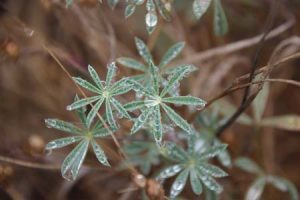
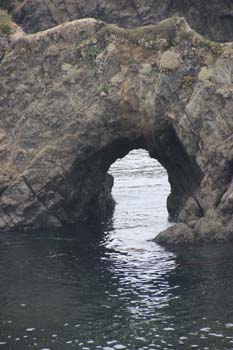
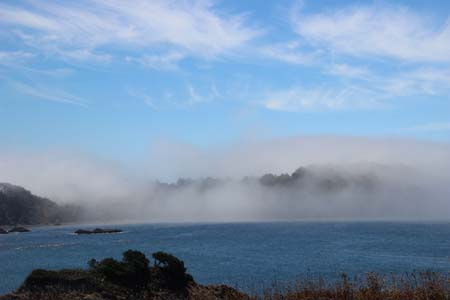
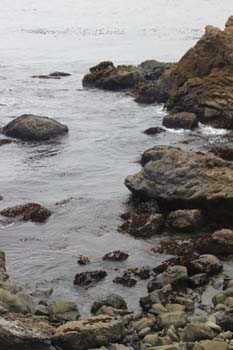
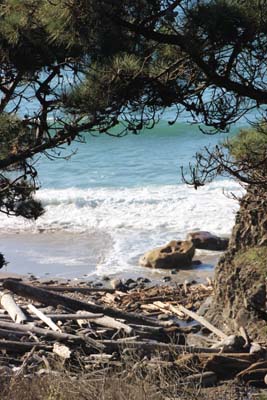
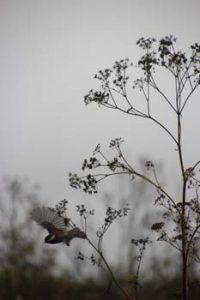
Oh, my! chilling. Love the fog draped over everything. Love that he’s a writer and she’s a photographer.
The cave is the defining element of the story. Stepping into it places Nina not just in a new environment, but in another time and place.
Your characters don’t seem in tune with each other. They are distant in terms of interests, so it’s kind of telling that they end up separated, probably forever, at the end.
Well done.